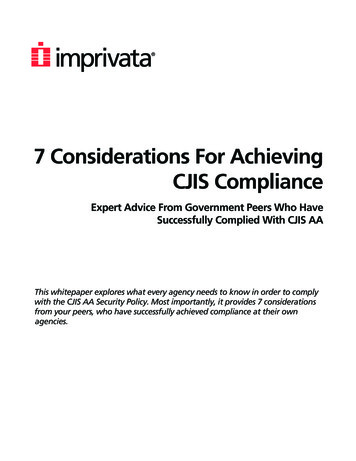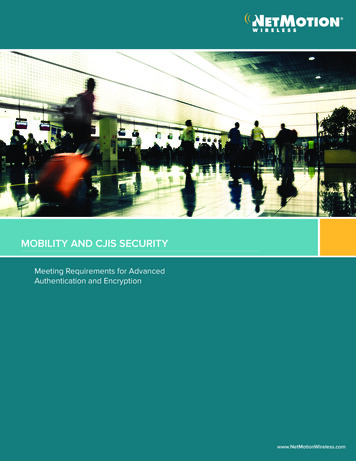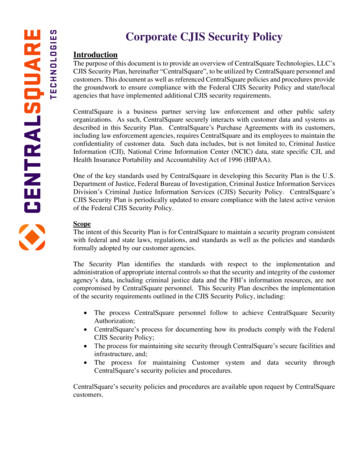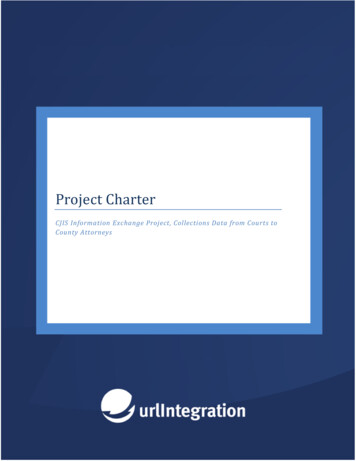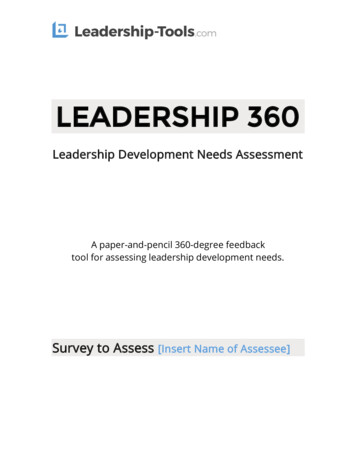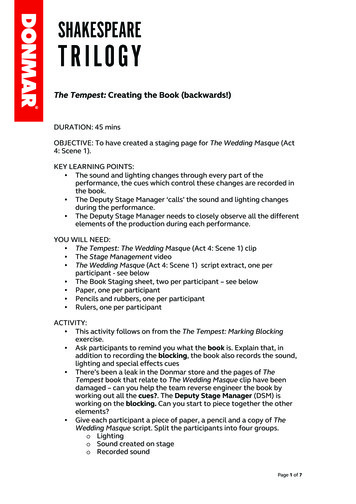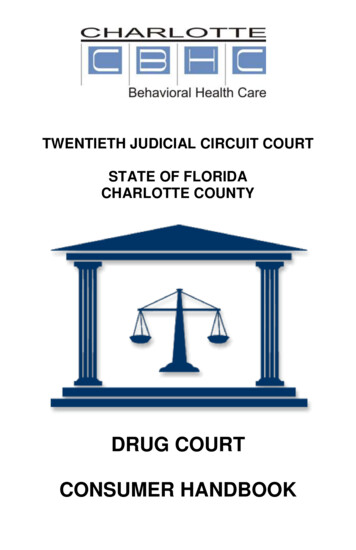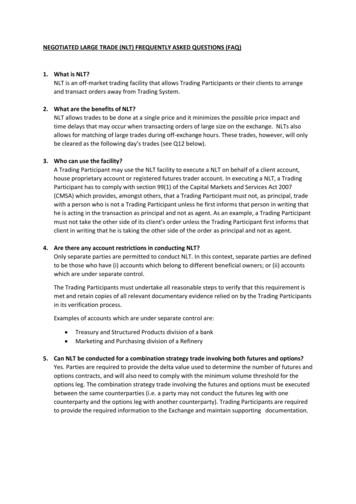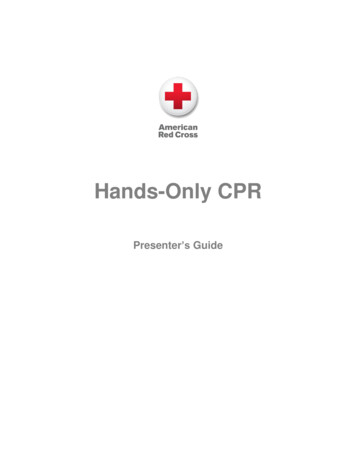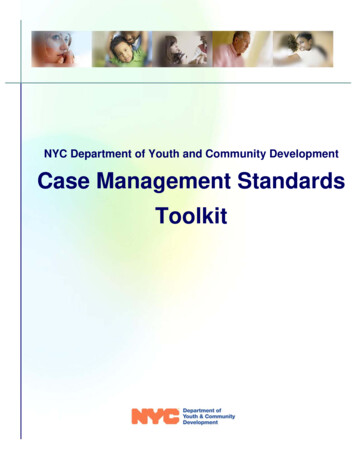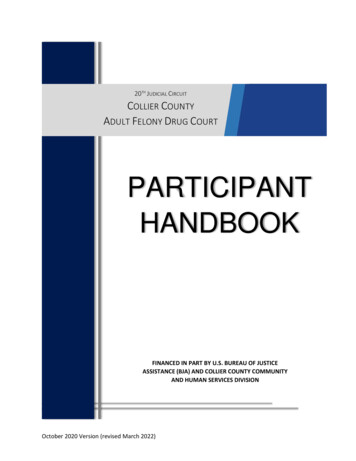
Transcription
20TH JUDICIAL CIRCUITCOLLIER COUNTYADULT FELONY DRUG COURTPARTICIPANTHANDBOOKFINANCED IN PART BY U.S. BUREAU OF JUSTICEASSISTANCE (BJA) AND COLLIER COUNTY COMMUNITYAND HUMAN SERVICES DIVISIONOctober 2020 Version (revised March 2022)
TABLE OF CONTENTSMISSION STATEMENTPROGRAM OVERVIEWTHE TEAMELIGIBILITY & EXCLUSIONARY CRITERIAPHASE REQUIREMENTSTREATMENTRECOVERY SUPPORT GROUP MEETINGSCASE MANAGEMENTCOURT APPEARANCESCOURTROOM & TREATMENT ETIQUETTEPROPER COURTROOM & TREATMENT ATTIREINCENTIVES & SANCTIONSDRUG & ALCOHOL TESTINGDILUTES/ADULTERATIONSEMERGENCY PROCEDURESMEDICATION & MEDICAL DISCLOSURE POLICYBANNED SUBSTANCES & AVOIDING “FALSE” POSITIVE DRUG TEST RESULTSMEDICATION ASSISTED TREATMENT (MAT)PROBATIONEMPLOYMENT, EDUCATION, & VOCATIONATTENDANCE & TARDINESSFINANCIAL OBLIGATIONSMOVING ON TO AFTERCARESUCCESSFUL COMPLETIONTERMINATIONTRANSFERS & RELOCATIONCONFIDENTIALITYDRUG COURT RULES & 1515162
MISSION STATEMENTSaving the lives of individuals with substance use disorders, strengthening families, and enhancingcommunity safety through evidence-based treatment and practices by promoting honesty, personalresponsibility, wellness, and recovery.PROGRAM OVERVIEWThe Collier County Drug Court program is a court-supervised substance use disorder treatment programfor individuals over 18 years old, who have a pending felony case and a substance use disorder. (See fulleligibility criteria on the next page.) The goal of the program is to break the cycle of substance usedisorder, crime, and incarceration. It is a post-adjudication program, meaning all defendants who enterthe program must enter a plea and be sentenced into the program as a special condition of probation.Entry into the program is voluntary. However, once an individual has been sentenced, they may notvoluntarily withdraw from the program without facing a violation of probation. Those individuals, whoare determined to be both legally and clinically appropriate for the program, and wish to participate, willsign a contract with the terms of their plea and agree to follow all program rules and requirements. Thishandbook contains information about the rules, requirements, and expectations.The Drug Court program is a strict sobriety-based program that lasts a minimum of 24 months. The firsthalf of the program consists of 5 In-Court phases, totaling a minimum of 12 months, which is thenfollowed by at least 12 months of Aftercare. Your needs and progress will ultimately determine thelength of your Drug Court participation. A treatment plan will be developed to meet your individualneeds, and will be reviewed with you and updated frequently. Additionally, the program includes selfhelp recovery support group meetings, case management, regular court appearances, random drugtesting, reporting to probation, and the requirement to maintain consistent employment and/orschooling. These requirements are based on program assessments, case planning, treatmentrecommendations, and the individual needs and abilities of each participant.THE TEAMThe Drug Court Team combines court supervision with substance abuse treatment and is made up ofmembers from the criminal justice system and a treatment provider. The David Lawrence Center is thecontracted treatment provider for Collier County’s Drug Court Program. The team meets every week todiscuss participant progress. The team decides incentives and sanctions, when a participant is eligible tophase-up and move-on, or if a participant should be terminated from the program. The team includes:ooooooooooJudgeAdministrative Office of the Courts CoordinatorCliniciansCase ManagersState Attorney’s Office ProsecutorState Attorney’s Office CoordinatorPublic Defender’s Office Defense AttorneyPublic Defender’s Office Social WorkerProbationLaw Enforcement3
ELIGIBILITY CRITERIAThe following criteria are intended to be a guide for those considering making a referral to drug court. Ifthere are any criteria that you might not meet, you are still encouraged to speak to your attorney aboutmaking a referral. Each case will be considered on an individual basis, and your case may includecircumstances that would permit your entry to the program. 18 years of age or olderResident of Collier County, or willing to reside in Collier County for the duration of the drugcourt program (minimum of 2 years)o Transfers to or from another Florida county may be possible, and are determined on acase-by-case basis Legally appropriate as determined by the state attorneyo Charged with one or more felony charges of the 2nd or 3rd degree Charge(s) must not be a sexual or sexually-motivated Charge(s) must not include sale or trafficking of controlled substanceo Must score to 60 points or fewer on scoresheet Clinically appropriate as determined by the treatment providero Must undergo a clinical screening to verify a substance use disordero Must then undergo a clinical assessment to verify need for intensive substance usetreatment and capability to complete program. Assessment must confirm existence ofmoderate to severe substance use disorder (as well as any other co-occurringdisorders) Any co-occurring mental disorder(s) must be sufficiently stabilized so thatparticipant can manage all program requirements set forth in this handbooko Must also undergo a risk/needs assessment to confirm applicant is at a high risk to failin a less-intensive treatment program, and has a high criminogenic need for treatmentof a substance use disorder (and any co-occurring disorder)o Participant must be willing to comply with all rules and requirements set forth in thishandbook, and with all treatment recommendations Regarding any medical conditions, participant must be willing to consent to sign all necessarymedical releases to allow team members to coordinate care with prescribing physician(s) forphysical health, mental health, and substance use disorder needso FDA-approved medications to assist with treatment for substance use disorder arepermitted, so long as participant complies with all rules to obtain and lawfully use themedication safely Participant must be able to comply with all rules set forth in this handbook, includingattendance at all treatment sessions, self-help meetings, frequent drug testing, payment ofrestitution to any victims, and maintenance of minimum employment or schoolingrequirements for each phase4
EXCLUSIONARY CRITERIA Immigration holdHold or detainer for any other jurisdictiono You are encouraged to speak with your attorney to see if this can be addressed toreturn you to eligibilityRegistered sex offender or sexual predatorVictim(s) reasonably withhold consent to allow entry to drug courtCharge(s) carries a statutory minimum mandatory prison sentence5
PHASE REQUIREMENTSPhase 1: Minimum of 30 Days Random Drug and Alcohol Testing Random Home Checks Follow all Probation Instructions Follow all Treatment & Case Management Instructions Participate in Treatment as Determined by Your Needs Weekly Court Appearances Drug Offender Probation Curfew 10:00pm-6:00am Seek Employment or Education Minimum of 14 Days of Sobriety to advance Minimum of 14 Days without a sanction to advancePhase 2: Minimum of 60 Days Random Drug and Alcohol Testing Random Home Checks Follow all Probation Instructions Follow all Treatment & Case Management Instructions Participate in Treatment as Determined by Your Needs Weekly Court Appearances Drug Offender Probation Curfew 10:00pm-6:00am 10 Hrs Weekly of Work, School, or Community Service Consistent Restitution Payments (if applicable) Minimum of 30 Days of Sobriety to advance Minimum of 14 Days without a sanction to advancePhase 3: Minimum of 90 Days Random Drug and Alcohol Testing Random Home Checks Follow all Probation Instructions Follow all Treatment & Case Management Instructions Participate in Treatment as Determined by Your Needs Bi-Weekly Court Appearances Drug Offender Probation Curfew 10:00pm – 6:00am 20 Hours Weekly of Work, School, or Community Service Consistent Restitution Payments (if applicable) Minimum of 60 Days of Sobriety to advance Minimum of 14 Days without a sanction advancePhase 4: Drug Offender Probation converted to regular probation& Curfew lifted (case by case basis) Minimum of 90 Days Random Drug and Alcohol Testing Random Home Checks Follow all Probation Instructions Follow all Treatment & Case Management Instructions Participate in Treatment Determined by Your Needs Monthly Court Appearances 30 Hours Weekly of Work, School, or Community Service Consistent Restitution Payments (if applicable) Minimum of 90 Days of Sobriety to advance Minimum of 14 Days without a sanction to advancePhase 5: Minimum of 90 Days Random Drug and Alcohol Testing Random Home Checks Follow all Probation Instructions Follow all Treatment & Case Management Instructions Participate in Treatment as Determined by Your Needs Monthly Court Appearances 30 Hours Weekly of Work, School, or Community Service Consistent Restitution Payments (if applicable) Minimum of 180 Days of Sobriety to advance Minimum of 14 Days without a sanction to advance Prepare Life Skills PlanAftercare: Minimum of 1 Year Minimum 90 days of Aftercare Tx & Case Management Random Drug and Alcohol Testing Follow all Probation Instructions Follow all Treatment & Case Management Instructions Participate in Treatment as Determined by Your Needs Consistent Restitution Payments (if applicable)The entire Drug Court team determines phase advancement.You will fill out a phase advancement application that will beturned in 1 week before you are eligible to phase. DO NOTASK TREATMENT WHEN YOU WILL PHASE OR YOUR PHASEADVANCEMENT MAY BE DELAYED.6
TREATMENTNo two people are the same. As such, everyone facing addiction experiences it differently. Therefore,your treatment plan will be designed to meet your unique needs. You will complete an in-depthsubstance abuse evaluation with a member of the treatment team to determine the level of care youneed and develop a treatment plan that focuses on treatment options that best suit you. Your treatmentplan will be updated as you progress through the program.A number of services may be included in your plan to address both substance use disorder and mentalhealth including group therapy, individual therapy, self-help recovery support group meetings,educational classes, intensive outpatient treatment, residential treatment, and medication. You mustfully participate and comply with all treatment requirements in your treatment plan.RECOVERY SUPPORT GROUP MEETINGSWhile in Drug Court, your treatment provider may recommend you attend self-help recovery supportgroup meetings. Examples may include Alcoholics Anonymous (AA), Narcotics Anonymous (NA), SMARTRecovery, or other self-help recovery support groups based on your individual needs. Support isimportant to your recovery. Your required number of meetings a week will be determined by yourtreatment provider and may be adjusted in your treatment plan. The treatment team will provide youwith information regarding meeting schedules and locations.You will be required to submit weekly reaction sheets as proof of attendance. Be sure you are filling outyour reaction sheets immediately following the meeting, and be sure to include the accurate date,location, and topic of the meeting. Falsifying reaction sheets will result in a sanction or possibletermination from the program. Non-compliance with any treatment requirements will be reported tothe team and addressed by the Judge.CASE MANAGEMENTUpon your entry into Drug Court, you will be assigned a case manager from the David Lawrence Center.They are your guides throughout the duration of the program and are there to provide social servicesupport, monitor your progress, and perform drug and alcohol testing. They can assist you with yourhousing, transportation, family, and general living needs.7
COURT APPEARANCESAs a Drug Court participant, you will be required to appear in court on a regular basis to discuss yourprogress with the Judge and any problems you might be having. The Judge receives a weekly progressreport from both the treatment provider and probation, so be sure to be honest. During courtappearances the judge will award incentives, impose sanctions, and participants may have moving-onceremonies. The number of court appearances required is determined by your phase. Courtappearances are mandatory, and failure to appear will result in a bench warrant for your arrest.COURTROOM & TREATMENT ETIQUETTEThe following guidelines apply to both the courtroom and all treatment settings: DO arrive 10 minutes earlyDO use the restroom beforehandDO address the Judge, Bailiffs, Attorneys, Court Staff & Treatment Staff with respectDO wear appropriate attireDO be respectful and quiet DO NOT bring cell phones or any other electronic devicesDO NOT leave until you are dismissedDO NOT talk while treatment or court is in sessionDO NOT bring food, drinks, or chew gumDO NOT use profane languageDO NOT sleepDO NOT wear inappropriate attirePROPER COURTROOM & TREATMENT ATTIRE Men are required to wear shoes with socks; long pants with a belt; and a collared shirt tucked in.Women are required to wear shoes with socks or sandals; Dress, or skirt, or long pants; blouse, orcasual dress shirt and/or sweater.NO bare shouldersNO midriffs or revealing clothingNO see-through topsNO underwear, bra straps, or boxers showingNO t-shirts, tank tops, muscle shirts, halter tops, tube topsNO dresses or skirts that fall above the kneeNO shortsNO ripped/torn jeans, baggy pants that fall below your waistNO flip flopsNO hats, bandanas, sunglassesNO clothing with an emblem, logo, or wording that promotes illegal or inappropriate activityNO clothing that depicts or promotes gang affiliation, violence, sex acts, drug/alcohol use, orprofanity8
INCENTIVES & SANCTIONSAn incentive is a reward for meeting or exceeding all program requirements and following the rules.Incentives may include, but are not limited to: Verbal praise from the JudgeApplausePhase PromotionTravel Pass Night off curfewEarly dismissal from courtThe Drug Court CupA sanction is a response for not meeting program requirements or not following the rules. Sanctionsmay include, but are not limited to: Verbal WarningsWriting assignmentsCommunity Service HoursCurfew enhancementsIncreased drug testing Phase/Graduation delaysWeekend WorkWeekend LockdownJailTermination Drug/Alcohol use without prompthonestyFailure to complete previously imposedsanctionAssociation with people who areengaged in criminal activitiesNew arrestTampering with a UACriminal behaviorAbscondingFalsifying document of any kindLying to the judge, treatment,probation, or any member of the teamCommon Violations include, but are not limited to: Late for a program requirementFailure to complete an assignmentIncomplete/Incorrect meeting sheetsand/or paperworkMissed Drug TestCurfew violationFailure to comply with Treatment’s orProbation’s InstructionsFailure to gain/maintainemployment/full-time student statusUnexcused absenceDilute Drug TestDisrespectful to Staff Your honesty is the most important factor in the determination of sanctions. Other factors theteam will consider include, but are not limited to length of time in Drug Court, number of priorviolations and sanctions, especially of the same or similar nature, attitude, efforts to correct theproblem promptly, and overall progress in treatment and in court.9
DRUG & ALCOHOL TESTINGThe Collier County Drug Court Program is a sobriety-based program. You will be tested for the presenceof drugs, alcohol and any banned substances throughout your entire time in the program and while onprobation. You are responsible for contacting both treatment and probation as instructed to find out ifyou are required to test that day. Failure to make contact as instructed may result in a sanction. If youmake a mistake or forget to make contact as instructed, you should immediately contact your casemanager and/or probation officer, and they will instruct you on how to proceed.Testing by urinalysis is our primary form of testing. It is random and is always observed, and all tests arelaboratory confirmed. When either individual or emergency circumstances make it appropriate, we mayalso employ other forms of testing, such as remote alcohol monitors, oral swabs, sweat patches andother approved means to detect unlawful substances.Missing any form of a drug test or failing to submit a sample will be treated as a positive drug test andwill result in a sanction. Diluting or tampering with your sample is dishonest. A diluted drug test may betreated as a positive and may result in a sanction. Tampering with a drug test may result in terminationfrom the program. Honesty is always the best policy.DILUTES/ADULTERATIONSWhat is a dilute? A dilute is one form of an adulteration to a urine drug test. It is a common methodused to conceal the fact that a substance is in one’s system. A diluted sample can occur as the result oflarge quantity intake of fluids in a short period of time prior to testing.What is an adulteration? It is any interference done to a test or test sample pre-collection OR postcollection. It may include blocking or damaging a detection mechanism, or adding substances to a drugtest or taking over the counter supplements.How is a dilute or adulteration determined? The lab determines whether a sample isdiluted/adulterated. The lab measures various indicators such as creatinine, pH, and specific gravity, inorder to ensure that a sample is valid and has not been adulterated.What is the consequence of a dilute or adulteration? As stated above, a diluted or adulterated samplemay be considered a positive test and a sanction may be imposed. It will restart your sobriety date, anddelay your phasing. This information is provided so that you do not unintentionally or intentionallyprovide a diluted or adulterated sample. You are encouraged to ensure that you are not drinking anexcessive amount of water, coffee, energy drinks or any other fluids prior to a drug test. For tests otherthan urinalysis, you are likewise encouraged to ensure that you follow all instructions and take allreasonable steps to submit a valid test. If you have any questions, please ask your case manager orprobation officer.10
EMERGENCY PROCEDURESFrom time to time, circumstances may arise that require us to adjust the procedures set forth in thisHandbook. Such circumstances may include a personal emergency for you, such as a need to undergo amedical procedure, or a need to travel to attend a funeral. Such circumstances may also include a moregeneral public emergency, such as a hurricane or other natural disaster, or a pandemic or other publichealth emergency.When such circumstances arise, the Team may need to adjust drug-testing procedures, and may alsoneed to adjust the manner in which you attend treatment, communicate with your case manager andreport to court and/or probation. These adjustments will be limited in time and scope to the extentpossible, and will be intended to balance the safety of all Participants and Team members with therequirements of providing structure and accountability within the boundaries of the law.MEDICATION & MEDICAL DISCLOSURE POLICYAll medication must be coordinated between your prescribing physician and your Case Manager andmust be FDA approved. This includes over-the-counter medications and prescriptions. This will ensurecompliance with all medical and substance use disorder treatment protocols.Cold and cough medication that contain alcohol, and allergy medications or sleep aids that containPseudoephedrine, Diphenhydramine HCL, or Ephedrine can cause a positive drug test result. For thisreason, you must immediately inform your Case Manager of any over-the-counter or prescribedmedications that you are currently taking. Your Case Manager can provide you with a list of over-thecounter remedies for common ailments such as colds, the flu or minor injuries and soreness; theseremedies will not cause a positive drug test result.Anyone on the team may request to examine your medication at any time. If it is determined that yourmedication is being diverted or abused, or that you are not taking the medication as prescribed, it mayresult in a sanction.If you still have extra or “leftover” medications from a prior prescription that you stopped taking, youshould speak to your Case Manger about proper disposal, and you should not consume thesemedications unless you are once again directed to do so by the prescribing physician.It is against the law to take prescription drugs that were not prescribed for you. If you take someoneelse’s medication, or if you share or sell your own medication to anyone, you may be charged with anew crime and it may result in your termination from the program.You must immediately inform your Case Manager of all doctor visits, dental visits, emergency roomvisits, scheduled surgeries, post-operative care, and all other medical appointments. You will berequired to promptly provide any releases or documentation that is requested of you.You should ALWAYS tell you doctor or medical professional that you are in recovery, that you have ahistory of substance use disorder, and that you are participating in the Drug Court program.11
BANNED SUBSTANCES & AVOIDING “FALSE” POSITIVE DRUG TEST RESULTSThere are certain substances and foods that can cause a "false" positive drug test result. It isyour responsibility to avoid these substances and foods. If you ingest or expose yourself tothese substances or foods, a positive drug test will result in a sanction. You must inform yourcase manager of any vitamins or dietary supplements you are taking.YOU ARE RESPONSIBLE FOR EVERYTHING THAT IS USED ON YOUR BODY AND ENTERS YOURBODY. WHEN IN DOUBT, LEAVE IT OUT!!!No alcohol, period. This includesfoods cooked with alcohol, andbeverages labeled “NonAlcoholic.”No mouthwash and no breathstrips that contain alcohol.No hand sanitizer that containsalcohol.No perfumes, colognes, bodysprays, aftershave, astringents,or any other hygiene productsthat contain alcohol.No solvents, lacquers,insecticides, etc. If you workwith chemicals, you must speakwith your probation officer andcase manager.No foods containing poppyseeds.No mind- or mood-alteringsubstances, or hallucinogenicsubstances, even if they arelegal and/or “naturallyoccurring.” Examples include,but are not limited to Kratom,Kava, Spice, Bath Salts.No diet or performancesupplements, weight loss aids,work out aids, weight gainingaids, creatine, etc.MEDICATION ASSISTED TREATMENT (MAT)MAT is the use of medication, in combination with therapy, to treat substance use disorders. You areencouraged to explore MAT with the treatment team to determine if it might be a useful tool for yourtreatment and recovery. Any medication that is FDA approved for the treatment of substance usedisorders is permitted in Drug Court. However, you must strictly follow all instructions given to you inorder to ensure that your use of that medication is proper and lawful. The use of MAT will be closelycoordinated and monitored by the Drug Court team and the prescribing medical professionals.12
PROBATIONAll participants will be placed on drug offender probation for at least the first three phases of DrugCourt. Then on a case-by-case basis, participants may be moved to regular probation thereafter.Probation continues even after Moving On to Aftercare, through all of Aftercare, and will typically last aminimum total of 2 years. The probation officer assigned to Drug Court has been specially trained and isa critical member of the Drug Court team. You are expected to comply fully with all of your probationofficer’s instructions. You will be required to check-in with your probation officer and call the probationdrug testing line as instructed. Probation will also supervise your curfew, make random home visits,perform random drug testing, oversee restitution payments (if applicable), and monitor youremployment and any community service that might be imposed.You will have a curfew of 10:00pm-6:00am for the first three phases of Drug Court. You must be at yourregistered residence during curfew hours. If you need a curfew extension for employment purposes, youmust follow probation’s instructions and obtain permission from probation in advance. Curfewextensions and exemptions are considered an incentive for participants who are doing well, and areconsidered on a case-by-case basis.Requests to travel out of county are considered an incentive for participants who are doing well, and areconsidered on a case-by-case basis as well. You must follow all of probation’s instructions for requests totravel. Defendants under a sanction or violation of probation are not eligible to travel out of the county.Probation will also make random home visits both with and without law enforcement escorts. Yourresidence must be alcohol and drug free. Your house, vehicle, and person may be searched byprobation- without a warrant- for alcohol and other illegal substances.An important part of recovery includes taking responsibility for your actions and making amends. If youowe restitution, you will be required to make consistent minimum monthly payments as set forth inyour Drug Court contract. Failure to comply with restitution payments may delay your phaseadvancement or moving-on and could result in a formal Violation of Probation. If you find yourselfstruggling to keep up with these payments, you should speak with your probation officer and yourattorney.EMPLOYMENT, EDUCATION, & VOCATIONRecovery from substance use disorder includes developing life skills to become a self-sufficient andproductive member of the community. During your time in Drug Court, you will be required to begainfully employed by a legally recognized business, or enrolled full-time in educational or vocationaltraining. The number of required work or school hours depends on your phase. If you are not working,you must be a full-time student or be performing community service hours in place of the requirednumber of employment hours. If you need help finding employment, speak with your case manager.Drug Court is an opportunity for you to better yourself. If you have not graduated from high school, nowis the time to consider obtaining your GED (General Equivalency Diploma). Your case manager can assistyou with getting started.13
ATTENDANCE & TARDINESSYou are required to attend all scheduled treatment sessions, meetings, court appearances, andscheduled events. Failure to attend any such event will be counted as an unexcused absence and will besanctioned. If you are unable to attend an event, you must contact treatment and/or probationimmediately. Excused absences are rarely given, and are usually reserved for emergencies only. In orderto be excused from an event, you must appropriately and timely contact treatment and/or probationupon becoming aware of your inability to attend an event. When applicable, you will be required toprovide documentation.You must be on time to all events. Arriving late is disruptive and disrespectful of everyone else’s time.You are expected to arrive 10 minutes early before all treatment sessions, meetings, court appearances,and scheduled events. You should plan ahead, and allow plenty of time to travel. If you are late, youmight not be allowed to attend the event, and this could be counted as an unexcused absence. If youare going to be late, you must contact treatment and/or your probation officer immediately.FINANCIAL OBLIGATIONSThere are several of different costs for which you may be responsible while you are participating in theCollier County Drug Court program. Restitution- you are responsible for paying back all restitution as set forth in your contract (ifapplicable).Court Costs- will be determined at the time of your sentencing and can include but are notlimited to costs of investigation, cost of prosecution, public defender fees, and standard courtfees.Cost of Supervision (Probation) - during your time in Drug Court your probation costs will be setat 0. Following your Moving On, you will be responsible for all probation fees.Treatment Costs- you will be responsible for paying for your treatment. Costs may be reducedbased on financial evaluation. Treatment costs are paid directly to the treatment provider.Drug Testing Costs- you will be responsible for drug testing fees. If funding is available,treatment might be able to cover the costs of drug testing. However, if you test positive ordilute, you will responsible for all costs associated with the test including laboratoryconfirmation.MOVING ON TO AFTERCAREMoving On is a special court event that celebrates your continuing recovery and completion of the InCourt portion of the Drug Court program. Once you have completed all requirements for each phase,you will be eligible to apply for Moving On. Upon approval of the application from the Drug Court team,an exit interview and a tentative Moving On date will be scheduled. You are required to keep complyingwith all the terms of your treatment plan and the rules of probation and Drug Court during this time.Failure to comply will result in a delay of your Moving On. Once you have Moved On you will continueinto Aftercare. The Aftercare portion of Drug Court is a minimum of 1 year. You will still be on probationand required to comply with all treatment recommendations according to your needs.14
SUCCESSFUL COMPLETIONSuccessful completion refers to the completion of both the In-Court and Aftercare portions of DrugCourt. You will be eligible to petition the court for early termination after a minimum of 12 months ofAftercare. Upon successful termination of your probation, your individual contract m
handbook contains information about the rules, requirements, and expectations. The Drug Court program is a strict sobriety-based program that lasts a minimum of 24 months. The first half of the program consists of 5 In-Court phases, totaling a minimum of 12 months, w

